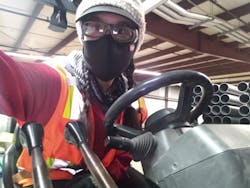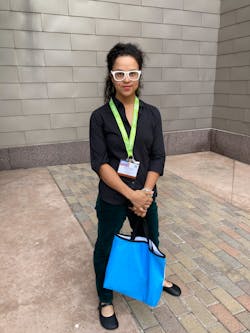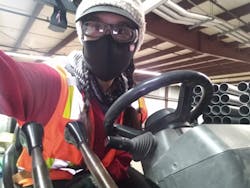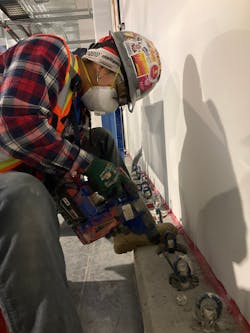Landing on Construction: My Journey Across the Globe
By Samantha Sprole
I do not come from a lineage of tradespeople, nor did I ever think as a young person that I would find a home in construction. Instead, I wandered through a thousand interests, a hundred places, multiple schools, and several career paths before arriving at the International Brotherhood of Electrical Workers Local 429 in Nashville, Tenn. Here, with my brothers and sisters in the trade, I’ve discovered how a good livelihood can intersect with one’s innermost values, become a duty to one’s community, and have the siren call to build a better future.
With some luck, my story of stumbling through life and onto a construction site will help more young women envision themselves in full command of their future — even in the male-dominated electrical contracting industry.
After almost eight years in higher education, I’ve become a firm believer in the “earn-while-you-learn” philosophy of the building trades. Today, I am a proud first-year apprentice electrician, studying at the Nashville Electrical Joint Apprenticeship and Training Committee (NEJATC) while working full-time with Rosendin, one of the largest employee-owned electrical contractors in the country. Week after week, hundreds of my fellow workers and I build the largest data center in Tennessee; two nights a week, I sit in class and learn the theory behind my craft. I’m thrilled to share the story of the circuitous path I took to get here.
My journey to now
My parents adopted me from an orphanage in Bogota, Colombia. Growing up in a multiracial household in a white community south of Boston, I learned that the easiest way to navigate diverse spaces was to strive for excellence in every endeavor. Before I really found a place where I belonged, I channeled my energies into schoolwork, sports, playing musical instruments, theatrical performances, and the visual arts. I tried everything I could get my hands on. Though I would make progress and pursue every competitive opportunity that came my way, I was never bitten by that singular drive — the confidence that I’d found a firm direction in life.
I earned a bachelor's degree in philosophy at the age of 19. Not wanting to go straight to graduate school to focus on ethics in the abstract, I decided to move to a fully income-sharing commune in rural Virginia. For two years, I helped cultivate food and maintain buildings/vehicles on those 400-plus acres shared by 100 people. It was here that I discovered my love for the craft trades; it was also here where I learned the intricate struggles of attempting to build Utopia. By the age of 21, I was ready to set off on my own again.
I worked as an educator for the next several years, receiving my master's degree in education while teaching at an English language school in Shanghai, China. Next, I pursued an opportunity to study for another master's degree in social science research in Taipei, Taiwan, concentrating on environmental standards in the island's heavy industry.
My background in English language arts led me to edit for numerous professors and graduate students before landing a copy-editor position at the now-defunct China Post newspaper. Living frugally, I soon earned enough to fund a two-month solo trip through Southeast Asia. Once I even took a trip to Indonesia just to be in the same room with my favorite living philosopher, and I made a complete fool of myself.
However, after five years of wandering, living the expatriate life in Asia, plus several months in central Europe, I felt determined to find a home where I could integrate better and potentially make a difference. Moreover, years spent hitting the books and toiling away behind computers soon took their toll on my spiritual well-being. I longed to reconnect with that sense of alignment among my work life, my moral convictions, and my grounding in the community I experienced in the commune. By 2021, I was ready to return to a more active lifestyle working with my hands.
Joining an apprenticeship program
While emerging from the COVID-19 lockdown, thankfully, I discovered the Music City Construction Careers (MC3) pre-apprenticeship program. Mingling with representatives from several union trades, I started to realize how the culture of trade union solidarity could potentially be that missing link — my gateway to integrating my values and my work. As the labor movement gathers steam in the United States, the unionized skilled trades have a profound role in building a better, more sustainable world.
I wasn’t completely sold on walking the electrician’s path, however — not until I met the president of Local 429, Kim Sansom. She was teaching a class for the MC3 program, and she happened to ask me what trade I was considering. I told her sheet metal work because I’d been sold on the intricate design skills and the unique aesthetic beauty of architectural sheet metal.
After I mentioned this, she led me and some other students through a door into the guts of the JATC school. Pointing to the perfectly laid out lines of shiny electrical conduit, she described the skill and craftsmanship involved in pulling off these carefully wrought electrical designs — designs that would power the very heart of the building and enable the learning that would happen within its walls. I was sold.
As I began to regain a sense of empowerment living in the United States and seeing the work needed to improve our infrastructure, I realized the electrical trade's centrality. Power generation and distribution are central to our societal imperative to limit greenhouse gas emissions and transition to ecologically regenerative systems. Even training as an inside wireman, I’m constantly reminded of how my chosen field contains the key to understanding and innovating what makes our homes livable, our economy moving, and our fingertips able to access the wealth of human knowledge with the stroke of a finger.
Now, as an apprentice with Local 429, I work daily to build a LEED Gold-certified data center powered by 100% renewable energy and using 80% less water than a typical data center. My fellow workers vary widely in age and experience level; I work with teenagers fresh out of high school and with Vietnam veterans nearing retirement.
When it comes to the younger workers around me, I’m confident that the future of construction will be in the hands of a competent generation of craftspeople less bogged down by the machismo stereotypes and expectations that burdened our elders. Now, on a typical construction site, it's more common for workers to share tips, resources, and support to help with things like mental health issues and work-life balance concerns. It’s no longer the norm for folks to suck it up and grit their teeth rather than reach out for help when needed.
I have also felt a warm welcome on-site from my more seasoned male colleagues. Although a few have told me they are not accustomed to working with women, I have found it relatively easy and rewarding to earn their respect by working smart and hard. My supervisors trust me to manage my tasks largely independently. Thanks to their patient instruction and advice, I have reached new levels of confidence working with the tools of my trade — from wire strippers and hydraulic pipe benders to forklifts and flatbed trucks.
I am sure that if more people were better acquainted with the world of construction, they could see (as I have) the opportunities in the skilled trades. For one, leaving a sedentary, computer-centric lifestyle has been a huge relief. Furthermore, I would love more people to realize that, as a union member, you could have the security of a pension and health insurance that isn’t determined by the whims of a single employer.
One might also learn the psycho-social benefits of joining a brother/sisterhood where your fellow workers are vested in your success and well-being — not only beyond your workplace and at the union hall but even at the international level of tradespeople who meet on the road. This is often happening while they wander the continent pursuing diverse work opportunities. As the saying goes on those cold winter days on-site, there’s heat in the tools; well, there’s also heart in the trades.
Now, as I embark on the latest stage of my journey, I’m continually inspired by tradeswomen like Kim Sansom, who came before me. Perhaps one day, I will also become a mentor to a new generation of craftswomen. Together, we can build a more ecologically flourishing world and a healthier, more inclusive construction industry.
Samantha Sprole is an apprentice with Rosendin Electric, headquartered in San Jose, Calif.



